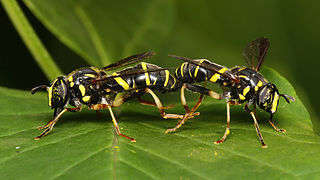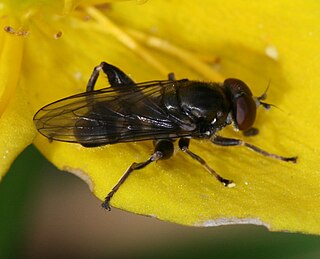Goldia is a genus of Palearctic butterfly in the family Lycaenidae. The genus is monotypic, containing the single species Goldia pacifica found in Primorye.

Xylota is a Holarctic genus of hoverflies similar in structure to the related genera Chalcosyrphus and Brachypalpoides. As the larvae are saprophytic they're usually found in rotting wood. The adult flies are generally associated with woodland and woodland edges and can often be seen running over the upper sides of leaves. Unlike other syrphids the adults of many species rarely visit flowers preferring instead to gather pollen from leaf surfaces. There are over 100 described species of which 12 can be found in Europe. Seven species have been recorded in Britain. Identification of species has been difficult and identifiction by photographs is risky.

Spilomyia is a genus of hoverflies. Many species in the genus show Batesian mimicry of wasp models, including black and yellow patterns and modified antenna shape.

Zeuxia is a genus of flies in the family Tachinidae.

Chalcosyrphus (Xylotomima) nemorum , the Dusky-banded Leafwalker, is a common species of syrphid fly with a Palearctic and Nearctic distribution. Hoverflies get their names from the ability to remain nearly motionless while in flight. The adults are also known as flower flies for they are commonly found around and on flowers, from which they get both energy-giving nectar and protein-rich pollen. Larvae have been found under the bark of Larix, Pinus and a variety of hardwoods.

Brachyopa is a Holarctic genus of hoverflies whose grey and brown colouration is unusual for this family and these flies can easily be overlooked amongst members of other fly families. The larvae can be found under the bark of dead branches and trees in decaying sap.

These are small black and yellow or mostly black flies with a narrow abdomen near the thorax. They occur mainly in damp places among low herbage. The larva of Neosascia are flattened without oral hooks and a have a short posterior spiracular process or "tail" rat-tailed that is saprophagous. In 1925 Curran reviewed the genus Neoascia. In this work a key is provided and ten species are described including four new species some of which have later been determined to be synonyms.

Pipiza is a genus Hoverflies, from the family Syrphidae, in the order Diptera. Most are dark hoverflies.
Blera eoa is a species of hoverfly normally associated with pine trees in Northern Sweden and Siberia. It is very similar to Blera fallax, except that its abdomen is all black.
Lejota is a genus of syrphid flies in the family Syrphidae.
Neoascia geniculata is a Palearctic species of hoverfly.
Chalcosyrphus okadomei is a species of hoverfly in the family Syrphidae.
Chalcosyrphus violovitshi is a species of hoverfly in the family Syrphidae.
Sphecomyia aino is a species of syrphid fly in the family Syrphidae.
Lejota villosa is a species of syrphid fly in the family Syrphidae.
Spilomyia graciosa is a species of Hoverfly in the family Syrphidae.
Xylota nartshukae is a species of hoverfly in the family Syrphidae.

Brachyopa dorsata is a species of hoverfly found in Europe.
Brachyopa maritima is an Asian species of hoverfly.
Brachyopa ornamentosa is an Asian species of hoverfly.







